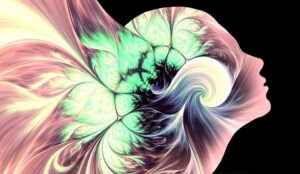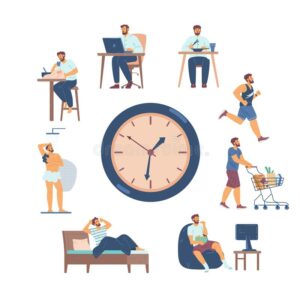If you’re feeling like you’re on top of the world one minute and then crashing down the next, it’s possible that you are experiencing manic symptoms. Mania is a symptom of bipolar disorder and can be very dangerous if left untreated. In this blog post, we will discuss 10 signs that you are experiencing mania and tips to recover from it.
Contents
What Are Manic Symptoms?
 Manic symptoms are usually characterized by an abnormally elevated mood. This could manifest as feeling elated, happy, or irritable. You may also feel a decreased need for sleep, which can lead to increased energy levels.
Manic symptoms are usually characterized by an abnormally elevated mood. This could manifest as feeling elated, happy, or irritable. You may also feel a decreased need for sleep, which can lead to increased energy levels.
In addition, before looking for a complete manic symptoms guide, you need to know what does it mean. So, manic is a state in which someone has an excessively and abnormally high level of energy, activity, and sometimes also mood.
This can be extremely detrimental to daily functioning as it can interfere with sleep. And, cause problems at work or school. Manic is itself is a symptom of bipolar disorder. But, it can also be caused by other conditions such as sleep deprivation or drug abuse.
It is important to recognize manic symptoms early. So, that you can begin to manage them and prevent them from getting worse. Here are ten signs that tell you’re experiencing manic symptoms:
10 Manic Symptoms
Look out for these signs that you may be experiencing manic symptoms:
Excessive Talking
It is a manic symptom when someone talks excessively. This could manifest as pressured speech. Where you feel the need to keep talking even when others are trying to interrupt or end the conversation. However, there is no such meaning to these excessive talks.
In fact, you may feel that this excessive talking is very important and the only thing that matters. You may also feel very confident and sure about what you’re saying. Even if it’s something that doesn’t make sense.
Inability To Concentrate
Manic symptoms can make it difficult to concentrate on one task. You may find yourself jumping from one task to another without being able to complete anything. This can be extremely frustrating and cause problems at work or school.
It is important to focus on one task at a time and break it down into smaller goals. This will help you to better manage your time and energy levels. Otherwise, out of the manic symptoms, this one can be the most disruptive. Because without being concentrated on anything, you can’t achieve anything.
Racing Thoughts
 Manic symptoms can cause your mind to race. You may find yourself thinking about a million different things at once. This can be very overwhelming and make it difficult to focus on anything.
Manic symptoms can cause your mind to race. You may find yourself thinking about a million different things at once. This can be very overwhelming and make it difficult to focus on anything.
You may also find that your thoughts are jumping from one thing to another very quickly. This can make it difficult to have a conversation or follow a train of thought. It is important to slow down your thoughts and focus on one thing at a time. Racing thoughts is usually a sign that you’re feeling overwhelmed.
Increased Energy Levels
One of the most common manic symptoms is an increase in energy levels. You may find yourself feeling more awake and alert than usual. This can be great for getting things done. But, it can also be disruptive to your sleep schedule.
It is important to find a balance between increased energy levels and getting enough rest. Otherwise, you may find yourself feeling exhausted and burnt out very quickly. This can be both good and bad depending on how you manage.
If you suddenly have increased energy levels, it may be due to mania. You may find yourself working on projects late into the night or early in the morning. And, feeling like you don’t need as much sleep as you usually do.
Decreased Need For Sleep
A decreased need for sleep is another common manic symptom. You may find yourself sleeping less than usual. Or, feeling like you don’t need as much sleep as you usually do. This can be great for getting things done. But, it can also lead to exhaustion if you’re not careful.
It is important to find a balance between decreased sleep and getting enough rest. Otherwise, you may find yourself feeling exhausted and burnt out very quickly. This can lead to problems at work or school. And, cause difficulty concentrating on tasks.
Impulsivity
This often manifests as spending sprees, risky sexual behavior, and making grandiose plans. If your impulsive behavior is starting to cause problems in your life, it may be a mania symptom. Impulsivity can also lead to risky behaviors that can cause harm to yourself or others.
Mania can also cause you to behave in ways that are out of character for you. You may act more impulsively and take risks that you normally wouldn’t. This can lead to problems at work, school, or in your personal relationships. So, it is important to recognize the signs of mania and get help if you are experiencing them.
Euphoria
 Euphoria is a feeling of intense happiness or well-being. It is common in mania and can be one of the most enjoyable symptoms. However, it can also lead to risky behavior. For example, you may take part in activities that are dangerous or make impulsive decisions.
Euphoria is a feeling of intense happiness or well-being. It is common in mania and can be one of the most enjoyable symptoms. However, it can also lead to risky behavior. For example, you may take part in activities that are dangerous or make impulsive decisions.
However, feelings of happiness and joy are significantly above what is considered normal. While everyone experiences happiness at times, someone in a manic state will often feel an exaggerated sense of well-being. And this is where it can become problematic, as it can lead to risky decisions being made.
Agitation Or Irritability
Agitation defines as feeling restless, anxious, or wound up. This can manifest as fidgeting, pacing, or feeling like you can’t sit still. It is often accompanied by an increase in energy levels and a decrease in the need for sleep.
In addition to feeling agitated, you may also feel irritable. This means that you are easily annoyed or angered by things that wouldn’t normally bother you. For example, you may get impatient with slow drivers or find yourself snapping at friends and family members for no reason.
Elevated Mood
This is related to the previous symptom in that if you’re feeling an exaggerated sense of happiness or elation, it could be a sign of mania. Be careful of confusing this with simply feeling good after completing a task or having a great day; elevated moods associated with mania will tend to be more intense and long-lasting than regular happiness.
It also includes the feeling of being “high” or invincible. And may manifest as inflated self-esteem. For example, you may feel like you can take on the world or that you’re destined for greatness. If these feelings are coupled with impulsive behavior, it’s likely a sign of mania.
Grandiose Thinking
Grandiose is often refers to an unrealistic sense of power, importance, or ability. So if you find yourself thinking big thoughts that seem impossible to achieve, it could be a manic symptom. This may manifest as making grandiose plans or taking on more tasks than you can reasonably handle.
Grandiosity is even related to various mental disorders. Such as bipolar disorder, schizophrenia, and narcissism. So if you find yourself thinking in grandiose ways, it’s important to consult with a mental health professional to rule out any underlying conditions.
Some of these symptoms may be manageable on your own. But, if you are struggling to cope with them it is important to seek professional help. Manic episodes can be extremely dangerous. So, get help from some professional or try out some of the self-care techniques.
Tips To Recover From Manic Symptoms
 When you identify the symptoms it is important to get the right kind of help. Here are some tips that may be useful in your recovery:
When you identify the symptoms it is important to get the right kind of help. Here are some tips that may be useful in your recovery:
Educate yourself
There is a lot of information available about manic symptoms. It is important to educate yourself about the condition. This can help you to understand your symptoms and develop healthy coping mechanisms. In fact, when you know about the condition it can help you to feel more in control.
Talk to friends and family
If you are experiencing manic symptoms, it is important to talk to your friends and family about what you are going through. They can offer support and understanding. Additionally, they can provide practical help with day-to-day tasks. Because friends and family are the ones who stay by your side during the tough times.
Join a support group
Support groups can be a great way to connect with others who are experiencing similar symptoms. Support groups provide a safe space to share your experiences and learn from others. In fact, they can offer practical tips for managing symptoms. There are various online and offline support groups available.
Identify your triggers
Triggers are anything that can cause your symptoms to worsen. It is important to identify your triggers so that you can avoid them or be prepared for them. Because triggers can vary from person to person. So, you can take care of this by keeping a journal of your symptoms. This can help you to identify patterns and triggers in order to avoid them.
Develop a healthy lifestyle
Having a healthy lifestyle is important for everyone. But it is especially important for those with mental health issues. There are various ways to develop a healthy lifestyle. But, some things that you can do include
- eating a balanced diet.
- exercising regularly.
- getting enough sleep.
- also, try to avoid alcohol and drugs.
These tips can help you to recover from manic symptoms. But, it is important to remember that recovery is a journey. So, take one day at a time and be kind to yourself. Because you are worth it.
Stick to a routine

When you are experiencing manic symptoms, it is important to stick to a routine. Having a routine can help to ground you and provide a sense of stability. Because it is important to stick to a routine when your world feels like it is spinning out of control. In fact, it can make all the difference and keep your lifestyle healthy for a long time.
Talk to the professional
It is important to seek professional help if you think you are experiencing manic symptoms. A professional can help you to understand your symptoms and develop a treatment plan. Manic symptoms can be serious and it is important to get the help you need. Some professional treatment options include;
- the psychiatric medication,
- various types of therapies
These professional help options can offer you long-term recovery from manic symptoms.
Stay positive
Staying positive is the utmost important thing you can do for yourself when recovering from manic symptoms. Because it can be easy to focus on the negative aspects of your condition. But, it is important to remember that there is hope and you can recover. So, stay positive and take one day at a time. It may take time, but you will get there.
Manic symptoms can be difficult to deal with. But, it is important to remember that you are not alone. There are people who care about you and want to help you recover. These tips can help you on your journey to recovery. So, take one day at a time and be kind to yourself. Because you are worth it.
Conclusion
To conclude, manic symptoms are important to identify. So that you can get the help and support you need to recover. If you’re experiencing any of the above symptoms, please reach out to a mental health professional for help. And in that case, TherapyMantra offers you a wide range of mental health services.
TherapyMantra is a team of expert mental health professionals that offer you personalized and convenient access to care, from the comfort of your own home. Therefore, overall you need to be proactive about your mental health and take the necessary steps to get better.
If you’re feeling like something isn’t quite right, or if you’re noticing any changes in your mood or behavior, please don’t hesitate to reach out for help. It could be the best decision you ever make.
A Word From Therapy Mantra
Your mental health — Your psychological, emotional, and social well-being — has an impact on every aspect of your life. Positive mental health essentially allows you to effectively deal with life’s everyday challenges.
At TherapyMantra, we have a team of therapists who provide affordable online therapy to assist you with issues such as depression, anxiety, stress, workplace Issues, addiction, relationship, OCD, LGBTQ, and PTSD. You can book a free therapy or download our free Android or iOS app.


